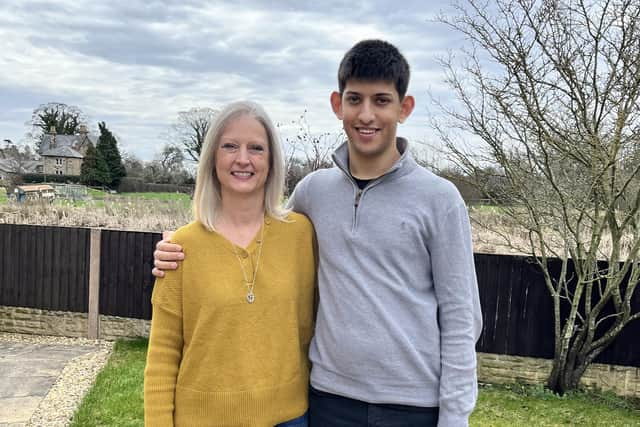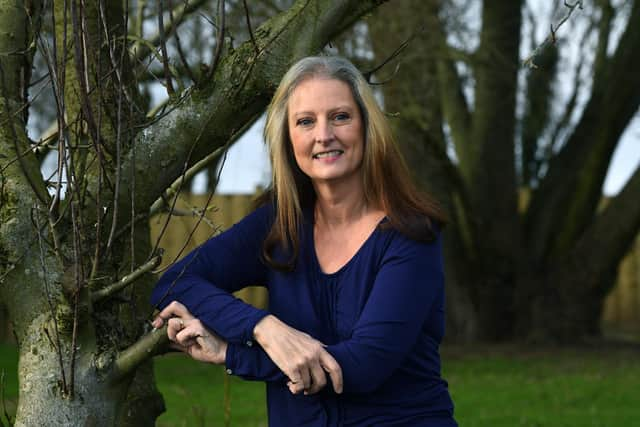Mum who gave son gift of life with kidney transplant to take on ultra-marathon in support of kidney research
In February 2022, Amanda became a living kidney donor for her son Phil, who was suffering from renal failure. Now she’s preparing to take on a 43-mile run to raise funds for Kidney Research UK, the charity dedicated to stopping kidney disease.
Phil, now 23, was born with impaired kidney function. “We knew at some point during his life that the likelihood would be he would have to go on dialysis or have a kidney transplant,” Amanda, from York, explains.
Advertisement
Hide AdAdvertisement
Hide Ad"Kidneys do decrease in function over their lifetime and if you’ve only got a relatively low level function to start with, they’ll eventually give up. So we knew it would happen. But he’d been really well, he played loads of football, was really active and we kind of just forgot about it. Until at the age of around 19 he started to go downhill with his health.”


Amanda dreaded the idea of her son going through months of dialysis as he waited for a suitable kidney to become available on the transplant list. And when she became aware of the possibility of becoming a living donor, she, along with her husband and eldest daughter underwent testing.
Remarkably, they were all a match – and Amanda decided to proceed. “It was a really easy decision to be honest,” she says. “I think most people would do anything they could to save the life of their children.”
Speaking to The Yorkshire Post last year ahead of the operation at Leeds General Infirmary, keen runner Amanda said she was hoping to take on a half or full marathon this year to support kidney research.
Advertisement
Hide AdAdvertisement
Hide AdShe’s actually going one step further, running the 43-mile Wold Rangers Way Ultra later this month. Phil’s initial response? A light-hearted text message, simply reading #overachiever.


“He would say he can’t express how thankful and grateful he is [for the kidney]…It doesn’t mean I get any better birthday presents though,” Amanda laughs. “This will be the furthest distance I’ve ever run, and it will be an amazing and tough 12 hour or so challenge but nothing compared to the stress of living every day with end stage renal disease."
Amanda, who works at the University of York, was aiming to raise £2,022, reflecting the year of the transplant, but has already smashed her target and raised more than £2,700. The support and sponsorship will keep her going, she says, but more important it will help to fund research that can change lives.
“Not everyone with chronic kidney disease is lucky enough to get a new kidney and so more research is needed,” she says.
Advertisement
Hide AdAdvertisement
Hide AdFor Amanda, taking on the challenge is also about raising awareness of live organ donation. Across the UK, more than 1,000 people each year donate a kidney or part of their liver while they are still alive to a relative, friend or someone they do not know.
The most commonly donated organ by a living person is a kidney as a healthy person can lead a normal life with only one functioning kidney and therefore they are able to donate the other to help someone in need. In most cases a kidney donated by a living donor offers the best long-term outcome for the recipient.
For Phil, who lives in Nottingham, mum Amanda’s gift has been life-changing. A lack of energy from kidney disease was affecting his quality of life. Now, things are much improved.
Since the transplant, Phil has also got engaged and is due to get married this summer. “I suspect had he not had the transplant he wouldn’t have felt that he could do that because end stage renal disease is life limiting,” Amanda says. "He’s not physically super fit yet because that will take a long time to regain but he’s much much healthier.
Advertisement
Hide AdAdvertisement
Hide Ad"When you have kidney disease it affects all sorts of things - your heart, your blood, your bones, your blood pressure. Basically you’re poisoning your body everyday because your kidneys aren't cleaning the blood well. Now he’s on far less medication…and his outlook [is brighter]. It really has transformed his life.”
To donate to Amanda, visit /www.justgiving.com/fundraising/amanda-selvaratnam3
